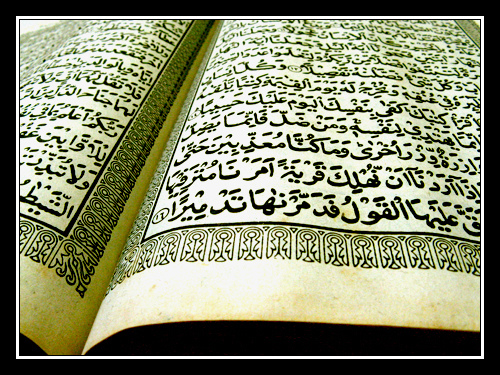Alt Muslim has an exclusive interview with author Sherry Jones, of Jewel of Medina fame. It is interesting to note that unlike the Danish cartoonists, it seems that Jones’ motivation in writing her book was to approach Islam from a sympathetic and conciliatory perspective:
ALTMUSLIM: unlike so many other times in our recent history where we are
struggling against people who are really out to vilify us, I sensed
from the beginning that you were doing this out of appreciation or
respect. I don’t think that has gotten through to a lot of people,
regardless of their opinions on the subject matter. Could you elaborate
on this?JONES: Yes, well I went into my reading with absolutely no preconceived
notions except that Muslims had attacked the World Trade Center and
that the Muslim regime in Afghanistan was very oppressive to its
people, especially women. And so, you might say that my initial
impressions of Islam were negative.But as I read – books by Western scholars, Islamic scholars, religious
clerics, ancient Arabic poetry – what I gained from my reading was an
impression of Islam being a religion of, primarily, peace. I read that
Muhammad admonished his followers to fight in self-defense only. That’s
really what he was doing all those years too. He was constantly being
persecuted, assassination attempts, etc.You could say that the revealer of Islam, Muhammad, embodied Islam. He
lived this incredibly ascetic life – totally unmaterialistic, gave
everything away to the poor. He could have lived like a king but he
didn’t. He was very respectful toward women and, actually, I was so
impressed by how he gave women rights that we didn’t even possess in
this country until the early 20th century. He was generous and kind and
compassionate. He forgave people who had done him wrong if they asked
him for it.The more I read about Islam at the beginning stages, the more impressed
I was. Muhammad endured so much persecution, there was never any doubt
in my mind that he was sincere and that he was a visionary. He gave up
everything for his belief in God and his, I believe, sincere desire to
bring the truth of one God to his own people.Having developed that respect, out of all the reading that I did – and,
you know, I read some stuff by older historians who claimed that he
went out and conquered in the name of Islam and forced people to
convert. But the newer stuff that I read, the more recent historical
writings, actually refute that. And the impression I gained of him was
of an incredible man and a great, heroic leader.
I think that it is important for muslims to understand the difference here between Jones’ book and actual hate speech of the kind embodied by the Danish cartoons. Jones demonstrates an appreciation for Muhammad SAW that is refreshing. Her interpretation of the relationship between him and his wife is that of a relationship first and foremost. It’s not surprising that she accepts the controversial argument that Aisha was only 9 years old at the time of marriage, since that seems to be the dominant view in the literature, even though it makes no sense when analyzed from historical sources. That supposed age discrepancy prodded her curiosity to write the book in the first place, and I think her intention is a valid literary pursuit. Whether the final product is indeed a sensitive treatment or a racy hijab-ripper is of course a different matter, and we can reserve judgement on its literary quality later, after we’ve actually read the thing.
Jones goes on to say,
I did all this in the service of what I see as a truth. My truth –
this is my vision of what things would have been like based on my own
experiences and my own research and my own intuition and observations
of human nature. I’m very sure of the work I’ve done and the choices
I’ve made. I know why I did everything I did in that book. Maybe at the
time I was doing it I wasn’t always sure, but I revised this book seven
times.Since this whole thing started, I’ve been accused of Orientalism, and
I’ve stopped and I’ve taken a step back to look at myself. How would we
feel if a Muslim wrote a fiction book about Jesus, how would that be
perceived? How would Christians feel? It’s hard for me, though I’ve
tried, to imagine myself among a group of people who feel discriminated
against and co-opted already. I can understand why there would be
resentment and suspicion of my motives.But I’m really aware and conscious of the choices I made. I have felt
that people who didn’t like my book might challenge me and that we
could discuss it.
I agree with her. And I think that it would be a good idea to discuss and challenge her, respectfully and without rancor, on her assumptions and her choices.
Read the whole interview at altmuslim.com – and there’s an extended version coming ot as a podcast next week which I will link to when available.

